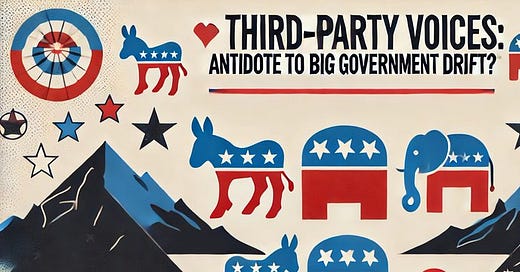🔥 Third-Party Voices: Antidote to Bipartisan Big Government Drift?
Imagine a government where big government doesn't burden your future with excessive spending, taxes, and regulations. Here's how...
The 2024 election showcased a familiar spectacle: Republicans and Democrats clinging to power while ignoring America's mounting fiscal and economic crises. With unified Republican control starting January 2025 under President-elect Donald Trump, there's optimism for change. But history is a stern teacher—both parties have repeatedly failed to embrace the free-market reforms needed to address runaway debt, inflation, and overregulation.
If you're like me and tired of the same old political tune, third parties might be the new harmony we need.
Leaders like Libertarian Chas Oliver, Independent Robert F. Kennedy, Jr., and outsiders lie Elon Musk and Vivek Ramaswamy challenge the entrenched status quo. They offer critiques of the bipartisan failure to rein in government overreach, promoting a return to limited government, fiscal responsibility, and the principles of free-market capitalism.
America's fiscal mess is a bipartisan failure.
With a national debt soaring past $36 trillion, both parties are complicit in this addiction to spending. Fiscal irresponsibility and Federal Reserve intervention drive inflation, which erodes our purchasing power. Regulatory bloat stifles innovation. A recent Pew Research poll reveals that 60% of Americans want a smaller government, yet neither party has delivered.
Will Trump seize the opportunity for pro-growth reforms, or will he veer towards protectionism, populism, and progressive policies from the "New Right"?
Republicans once championed fiscal restraint but now flirt with protectionism and interventionism. Democrats double down on expansive welfare and regulations, inching us towards socialism. Trump can reverse this trend, but will he take it? His approach could either heal or further deepen our economic woes.
Third-party candidates and independents are the catalysts for reform, providing a counterweight to this drift. They challenge the sacred cows of Washington politics with ideas grounded in liberty, sustainability, and economic opportunity. For instance, Chase Oliver advocates fiscal discipline, such as Colorado's TABOR, which could anchor federal spending to taxpayers' interests. Similarly, Robert F. Kennedy Jr. pushed for healthcare reforms that empower individuals, rejecting federal overreach.
Key reforms to reverse this trend include:
Ending corporate welfare, including the green energy scheme, to save billions and foster competition.
Reforming mandatory spending programs like Social Security and Medicare with private accounts, means testing, and age adjustments.
Adopting fiscal restraints like Colorado's TABOR to impose discipline on Congress.
Promoting free trade, especially with our allies, will lower prices and boost innovation, countering the current trend of protectionism.
Simplifying the tax code and cutting taxes for economic growth.
The choice is stark: embrace these reforms or continue the slide towards socialism.
With control in Washington, Trump and the GOP must decide whether to champion limited government and market-based reforms or perpetuate the status quo. They could look to independent thinkers for inspiration and embrace bold proposals to reduce spending, empower individuals, and restore free-market capitalism.
The future of America hinges on rejecting the failed policies of government expansion. By prioritizing fiscal restraint, deregulation, and individual liberty, Republicans can lead the nation away from socialism's grip and toward reviving free-market principles. Third-party voices, often sidelined, hold the keys to this vision.
Time will tell if Trump uses his influence for a pro-growth agenda or opts for a more populist, protectionist path. Which will it be?
My recent article on X: https://x.com/vanceginn/status/1867808152189612329?s=46&t=Zv07DS2UC3mLPAOmcJxg_Q




Enough with the damn third-party crap!
Shorty, you are so full of propaganda it’s hard not to laugh. We live in a system built for the wealthy, by the wealthy. Republicans & Democrats are their puppets. That’s why they embrace the same economic policies. The minor differences in economic policy reflec the need to keep you and I squabbling over which party best represents the American people.
It’s sickening that as we motorboat into fascism you are still dragging out the “slippery slope onto socialism trope. It’s like you don’t realize that the Founding Fathers built a system intentionally to prevent a socialist society.
We are ruled by the elites. The elites are freaking rich af. NONE of the elites wants to make this a socialist country. And why would they, doing so would mean giving up their wealth and luxury.
So for anyone who reads this, find Guardian_Bear on X.